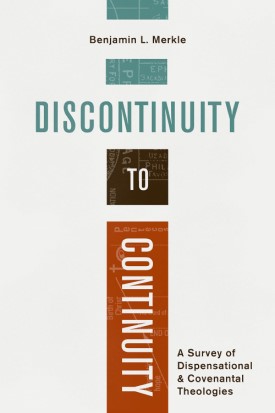Book Review: Discontinuity to Continuity: A Survey of Dispensational & Covenantal Theologies

Typically, when there is a multiple-views book, it is a multiple-author attempt to persuade the reader to a certain theological position. These books have a needed place in the church, but it is certainly not the only way to compare different theological viewpoints. Most recently, I read a refreshing book on the multiple-views theme by a single author, Ben Merkle. I want to highlight this book as a valuable resource in the field of understanding eschatological systems because of its unique approach.
Merkle’s book, Discontinuity to Continuity: A Survey of Dispensational & Covenantal Theologies (Lexham Press, 2020), is a multiple-views book by a single author (Merkle). However, rather than attempting to persuade the reader to any particular theological system, Merkle takes great pains to remain purely descriptive of the theological systems. I think he does a remarkable job in doing this, and to Merkle’s credit, he is able to describe each system fairly because he relies on primary sources and top scholars within those systems.
I was particularly impressed that Merkle took time and energy to get feedback on the book from Tommy Ice (classic dispensationalism), Michael Vlach (revised dispensationalism), Craig Blaising (progressive dispensationalism), Steve Wellum (progressive covenantalism), Richard Lints (covenant theology), and Kenneth Gentry (Christian reconstructionism). This ensures a fair presentation of each position since these scholars are some of the most well known representatives of these positions.
As hinted at above, the book is concerned with the following eschatological systems:
- Classical Dispensationalism
- Revised Dispensationalism
- Progressive Dispensationalism
- Progressive Covenantalism
- Covenant Theology
- Christian Reconstructionism
These six systems provide a spectrum of discontinuity to continuity, and Merkle investigates each system through the eyes of their proponents and through the lens of the following four questions:
- What is the basic hermeneutic?
- What is the relationship between the covenants?
- What is the relationship between Israel and the Church?
- What is the kingdom of God?
These four questions provide a good template by which readers can understand the various eschatological systems and recognize the various natures of continuity and discontinuity.
Like I mentioned earlier, Merkle’s goal is not to persuade a reader to any one theological system. Rather, his goal, as stated in the prelude to the book is as follows: (1) that Christians might know what they believe, (2) appreciate the views of others, (3) recognize that no theological system is perfect, (4) strive to know Scripture better. These are very worthy goals, and I think Merkle does a good job of motivating the reader in this way.
Obviously not everyone is going to fit neatly into each theological system. I know for myself and many other dispensationalists, we would be a mixture of some of the various categories. However, this book does provide a helpful template to define the distinctions and offer a starting point for many important discussions. I would highly recommend it for individuals who wish to compare and contrast the various eschatological viewpoints.